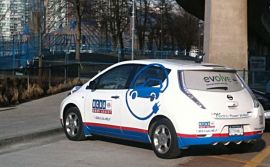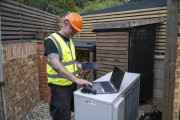By Alison Bailie, Pembina Institute, and Rebecca Spring, WWF-Canada
On Tuesday morning the government of British Columbia extended their Clean Energy Vehicles program. This means for at least the next year, residents of B.C. will continue to receive an incentive of up to $5,000 when purchasing an electric vehicle as well as a $500 rebate for installing an electric vehicle charging point at their home.
 We applaud the continuation of these incentives – which since introduction in December 2011 have resulted in 431 clean vehicle sales and 111 residential charging points installed. It’s also exciting to see that the government of B.C.’s early investment in infrastructure, with strong support from local governments, First Nations and businesses, has resulted in over 500 public charging stations across the province and plans for 13 fast-charging stations. With continuing incentives, and the opening of these public charging stations this spring, British Columbia is poised to become an electric vehicle hot spot.
We applaud the continuation of these incentives – which since introduction in December 2011 have resulted in 431 clean vehicle sales and 111 residential charging points installed. It’s also exciting to see that the government of B.C.’s early investment in infrastructure, with strong support from local governments, First Nations and businesses, has resulted in over 500 public charging stations across the province and plans for 13 fast-charging stations. With continuing incentives, and the opening of these public charging stations this spring, British Columbia is poised to become an electric vehicle hot spot.
British Columbia has shown tremendous leadership on electric vehicles and we think the province can build on this success by stating their on-going role in the transition to low-carbon transportation. By producing a clear action plan for electric vehicles, the province can help businesses, First Nations, local governments and citizens understand and participate in future activities. Here are five ideas that B.C. should consider for their action plan:
1. Set a target goal for number of electric vehicles in B.C.
B.C. should develop an electric vehicle target that aligns with environmental, economic and social objectives. Both Ontario and Quebec have plans in place. Over the longer-run, B.C. could consider a Zero Emissions Vehicle regulation, such as California’s, to fully back the electric vehicle target.
2. Expand efforts on home charge points
Installing at-home charge points will be key to facilitating electric vehicle ownership as 80 percent of charging will likely happen at home. The B.C. government can support the leadership undertaken by City of Vancouver where new, multi-family homes must provide space for future electric vehicle charging stations. The province could develop a Building Code option allowing other local governments to voluntarily enact such requirements for buildings in their communities.
3. Share information on electric vehicles and charging
Potential buyers of electric vehicles have many questions and are currently forced to weed through many different sources, often ending up with unanswered questions. This may have limited the sales and uptake of electric vehicles during the Clean Energy Vehicles program thus far. The B.C. government can take this opportunity to develop and maintain a portal of information with frequent updates that allows users to assess whether electric vehicles fit into their driving needs. Demonstrations of electric vehicles are also helpful for potential buyers. Hydro Quebec provides an example of engaging and interactive information on vehicles and charging.
4. Celebrate the network of charging stations throughout the province
Residents and visitors can travel throughout B.C. in their electric vehicles with the existing 500+ public charging stations and the 13 planned fast chargers. The province should celebrate this incredible network through tourism information, festivals and challenges. Dozens of public and private sector organizations have helped build this network of stations; all will benefit from increased visibility.
5. Support the full sustainable transportation transition
Electric personal vehicles are only one piece of a more sustainable transportation system. B.C. and all other provincial governments are urged to encourage other pieces as well, such as complete, compact neighbourhoods and affordable, accessible public transit.
Electric vehicles can significantly reduce greenhouse gas emissions from personal transportation, especially in British Columbia where electricity is nearly 100% renewable. Because of this great potential, we will be urging the government of B.C. to take new steps over the next year that ensure the clean vehicle transition will continue to be supported beyond the Clean Energy Vehicles program’s new expiry date of March 2014.
WWF-Canada is creating solutions to the most serious conservation challenges facing our planet, helping people and nature thrive. Join our Transportation rEVolution and tell us about your thoughts and experiences with electric vehicles.
The Pembina Institute provides research, planning, and outreach services to local governments and businesses interested in electric vehicles and charging stations. Contact us for information or an EV 101 session for your community or company. More information on Pembina Institute’s electric vehicle research and services can be found here.
In December 2012, WWF-Canada and the Pembina Institute jointly requested that the government of British Columbia extend the Clean Energy Vehicle incentives beyond the March 31, 2013 deadline.










